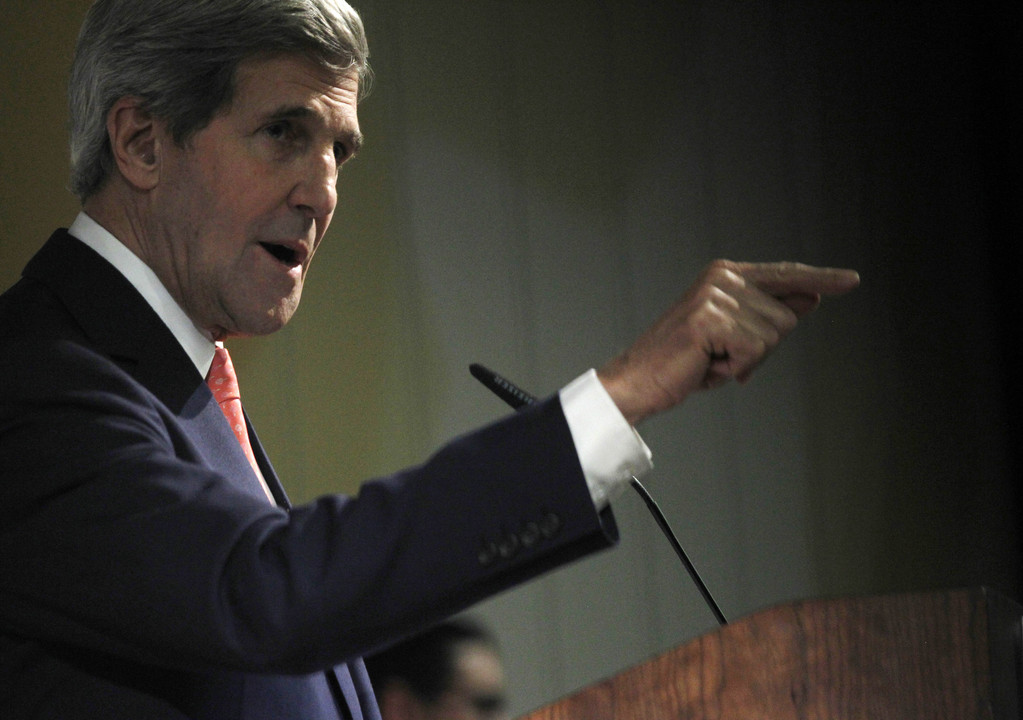DUBAI, United Arab Emirates — Iran and the United States on Monday blamed each other for the failure to reach agreement on a deal to limit Iran’s uranium enrichment in exchange for an easing of Western sanctions.
In spite of the accusations, there was some diplomatic progress as Iran promised to offer more information and expanded access to U.N. nuclear inspectors – including more openings at a planned reactor and uranium site.
U.S. Secretary of State John Kerry said Iranian envoys had backed away from a wider deal this weekend seeking to ease Western concerns that Tehran could one day develop atomic weapons.
Iran’s foreign minister, Mohammad Javad Zarif, countered by criticizing Kerry’s remarks, telling an Iranian TV talk show that the American’s “conflicting statements” damaged confidence in the process, adding that “considerable progress was made” in Geneva.
The flurry of announcements and comments showed both the complexities and urgency in trying to move ahead on an accord between Iran and world powers after the talks in Geneva failed to produce a deal.
With negotiators set to resume next week, Iranian officials promoted a separate pact reached with the U.N. nuclear chief Yukiya Amano as a “roadmap” for greater cooperation and transparency, which could move the talks ahead. But the plans do not mention some of the sites most sought by U.N. teams to probe suspicions of nuclear-related work, notably the Parchin military facility outside Tehran.
“It’s an important step forward, but by no means the end of the process,” Amano told The Associated Press in Tehran.
Western leaders, meanwhile, were keen to display a unified front after reports that France had broken ranks in Geneva and demanded more concessions from Iran on enrichment levels and an under-construction heavy water reactor that produced a greater amount of plutonium byproduct, which could be used in eventual weapons production. Kerry said it was Iran that put the brakes on reaching a first-phase agreement, but gave no details on the Iranian concerns and suggested it was only a matter of time before a formula is found.
“There was unity but Iran couldn’t take it,” Kerry said during a stop in Abu Dhabi. He added: “The French signed off on it, we signed off on it.”
Kerry told the BBC on Monday that negotiators had been “very, very close … extremely close” to reaching a deal with Iran.
“I think we were separated by four or five different formulations of a particular concept,” he said.
In the BBC interview, Kerry acknowledged “the French have been more vocal about one thing or another.” But he said, “the fact is that we had a unity on Saturday in a proposal put in front of the Iranians. But because of some the changes they felt they had to go back and change it.”
Later Monday, Zarif criticized Kerry’s remarks that blamed Iran for lack of a deal when asked about them on Iranian TV.
“Conflicting statements harm the credibility of the one who keeps changing positions and damages confidence. The goal of dialogue is to reduce the lack of trust. Conflicting talk doesn’t give credit to the person saying it,” Zarif said.
He said “considerable progress” was made during three days of talks in Geneva but claimed that most of the hours were spent with the U.S., Russia, China, Britain, France and Germany trying “to resolve differences among themselves.” He insisted any agreement must include the lifting of all Western sanctions against Iran.
British Foreign Secretary William Hague said the world powers presented a united front to Iran, and although “some gaps” remained, “most of those gaps are narrow.”
In Jerusalem, Israeli Prime Minister Benjamin Netanyahu has acknowledged that an overall deal is likely between Iran and world powers, which would undercut Israeli threats to launch military action against Iranian nuclear sites. Yet he hailed the delay as a chance to “achieve a much better deal.”
“The target date for this deal is the date on which a good deal will be achieved that will deny Iran a military nuclear capability,” he told Israel’s parliament Monday.
Copy the Story LinkSend questions/comments to the editors.



Success. Please wait for the page to reload. If the page does not reload within 5 seconds, please refresh the page.
Enter your email and password to access comments.
Hi, to comment on stories you must . This profile is in addition to your subscription and website login.
Already have a commenting profile? .
Invalid username/password.
Please check your email to confirm and complete your registration.
Only subscribers are eligible to post comments. Please subscribe or login first for digital access. Here’s why.
Use the form below to reset your password. When you've submitted your account email, we will send an email with a reset code.